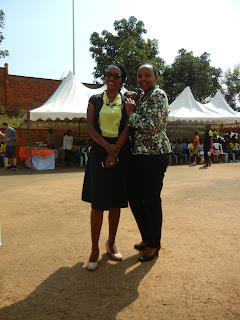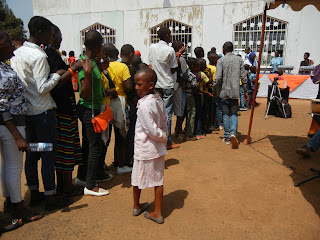Sadly, stealing is all too common in developing countries. No matter what the situation, it's hard to not feel violated, upset and angry. What's harder is to forgive and move on. Within my first week in Tanzania, I lost 2 Ipods and a set of headphones. I was devastated and confused as to why no one seemed to know who snuck into my home. Later, after a mutiple stolen phones and lost cash, you come to realize that items and money are transient and worse things can happen. Nevertheless, that doesn't take away the pain and frustration you feel each time it happens and, without doubt, it will happen. Travelers learn this painful lesson right off the bat. However, what can hurt the most, is when something is stolen from a space that you thought private and secure. Our clinic director, Chantal, experienced this today when her computer was stolen from inside her office. Despite me sitting outside working on my computer, someone managed to sidle inside and take her laptop. Her heartbreak was palpable. While she is a strong, patient and wise women, she couldn't help but be hurt. The words that she uttered right before leaving were "what hurts the most isn't the missing computer, but the lost documents and the disrespect." Unfortunately, too many of us can empathize with this pain.
These are my experiences and adventures in Kigali, Rwanda working with WE-ACTx on research from a family needs assessment and shadowing at their local clinics.
Wednesday, June 22, 2016
Stealing
Labels:
Africa,
Clinic,
Health,
Medical School,
Stealing,
Sub Saharan,
Thief,
Travel
Location:
Kigali, Rwanda
Monday, June 20, 2016
Our house
Here is a quick tour of the wonderful house that WE-ACTx has rented out for us to stay in. It is located in Kiyovu, one of the fanciest, if not the fanciest place in Kigali. The President of Kigali, Paul Kagame, is basically our neighbor. My housemates include Lizzy, a pre-med undergrad from Pennsylvania, Kerrlene, a graduate student at Tufts (Fletcher!) and Cari, a Peace Corps Response volunteer.
Downfall of such safi digs? The moto taxis always try to charge way too much. Le sigh. #WazunguProblems
Downfall of such safi digs? The moto taxis always try to charge way too much. Le sigh. #WazunguProblems
Labels:
Africa,
Expat,
Housemates,
Kigali,
Kivoyu,
Medical School,
Medical Student,
Rwanda,
Sub Saharan,
Travel,
WE-ACTx
Location:
Kigali, Rwanda
Sunday, June 19, 2016
African Child's Day
We were blessed enough on Sunday to be invited to WE-ACTx For Hope's celebration of African Child's Day (or International Day of the African Child, as Wiki calls it). African Child's Day is a holidy on June 16th that celebrates the rights and
importance of children in Africa. While it was started in honor of the children injured in the Soweto Uprising (in South Africa), it is celebrated all throughout Africa to bring awareness to the need for children's education and services.


We arrived just as the band was setting up (and rehearsing a phenomenal cover of “All of Me” by John Legend) and chatted with many of the Musicians Without Borders staff, including their community leaders that serve as teachers here and in farther villages. As the ceremony commenced, our eyes was blessed with an onslaught of singing, dancing, poems, skits and even a fashion show. The videos and pictures will do a much better job telling the story of the celebration than I ever could. Enjoy!!!
Here are some videos of the phenomenal dancing and singing that was performed:
Labels:
Africa,
African Child's Day,
Celebration,
Dancing,
Health,
Holidays,
Kigali,
Medical School,
Music,
Musicians without Borders,
Sub Saharan,
Travel,
WE-ACTx
Location:
Nyamirambo, Kigali, Rwanda
Saturday, June 18, 2016
Kigali Genocide Memorial Museum
On Saturday, Lizzy and I walked to the Kigali Genocide Memorial Museum. It was about an hour walk from our house but a great excuse to meander down the dirt streets that are so frequently avoided by wazungu in Kigali and snoop around MiniMarts that sell the million types of buscuits I was addicted to in Tanzania.
Upon reaching the museum, we were guided into a 5 minute movie with brief interviews of Rwandans who had experienced the genocide and their feeling behind the construction of a memorial. Kigali Genocide Memorial Museum(called Kigali Memorial by the locals) was built in 1999 to explain the genocide, provide a final resting place for those who were victims of the genocide and, serve as memorial that friends and family members could visit for prayer and peace.

Upon reaching the museum, we were guided into a 5 minute movie with brief interviews of Rwandans who had experienced the genocide and their feeling behind the construction of a memorial. Kigali Genocide Memorial Museum(called Kigali Memorial by the locals) was built in 1999 to explain the genocide, provide a final resting place for those who were victims of the genocide and, serve as memorial that friends and family members could visit for prayer and peace.

Although the museum is free to enter, you need to pay to
take pictures ($20) or listen to a guided recording ($15). Well-organized and staffed, the museum leads you step by step through the events and propoganda that brought about neighbors killing neighbors, friends killing friends and entire families being wiped up over a span of 100 days. The numbers are staggering - some 2,000 people per minute were murdered. The international community not only failed to act, but when they did, they inadvertently (or some may argue advertently) exaccerbated the situation. More than 250,000 victims are buried at the Memorial Museum.
As you move from display to display, you see quotes, pictures, stories, videos and remains of the casualties that lost their lives in the tradegy. One room consisted of hanging clothes, rows of skulls and piles of bones (not unlike the museum at Auschwitz) that provide even a meager glimpse into the sheer horror and magnitude of what happened in 1994. The current belief is that over 1 million people (mainly Tutsi but some Hutu's as well) were slaughtered during the genocide. Today in Rwanda it is illegal to say the words "Tutsi" or "Hutu" or identify people based on their ethnic group.
 |
| Family and friends gather around the coffins and pictures at a service of several genocide victums who are about to be buried at the Memorial Museum. |
 |
Lizzy and I recorded our reactions to the museum in this brief video.
Location:
Gisozi, Kigali, Rwanda
Friday, June 17, 2016
HIV Testing

My day was spent shadowing our clinic lab technician,
Abel. Not only is he a phenomenal technician,
he is a great teacher and freely explained how he goes about testing for HIV
and malaria. Since today was Friday, the
WE-ACTx for Hope clinic conducts free HIV testing for anyone who wants to be
tested. Today there were 5 patients were tested. There are a series of 3 different tests that are performed, with the first being the most sensitivity and the last being the least.
The Screening test is done is Rapid POC (point of care) HIV test labeled "CG" which stands for "Colloidal Gold". The Confirmatory test is a "Det" which stands for the "Determine HIV 1/2" test. Lastly, the Tie Breaker test is called "Unigold".
If the first 1 "Screening" test is negative, or the "Screening" and "Confirmatory" tests are both positive, then the third "Tie Breaker" is not performed. However, if there is a discrepancy after performing all 3, the samples are taken to the national laboratory and an ELISA test is done.
Here's are videos that explains the HIV testing and recording the results on the form that will be given to patients.
The Screening test is done is Rapid POC (point of care) HIV test labeled "CG" which stands for "Colloidal Gold". The Confirmatory test is a "Det" which stands for the "Determine HIV 1/2" test. Lastly, the Tie Breaker test is called "Unigold".
 |
If the first 1 "Screening" test is negative, or the "Screening" and "Confirmatory" tests are both positive, then the third "Tie Breaker" is not performed. However, if there is a discrepancy after performing all 3, the samples are taken to the national laboratory and an ELISA test is done.
 |
| Abel, our lab technician, records the results of the HIV testing for today. |
Labels:
Africa,
AIDS,
Clinic,
Health,
Healthcare,
HIV,
Kigali,
Medical Student,
Rwanda,
WE-ACTx
Location:
Kigali, Rwanda
Thursday, June 16, 2016
Family Needs Assessment
In 2014 and 2015, counselors from WE-ACTx for Hope administered a Family Assessment Survey to individuals who
were parents of a child under the age of 18 who was being treated at the
clinic. The counselors orally
administered a paper survey in Kinyarwanda, the national language, and the data
was input into an Excel spreadsheet for analysis and utilization. The clinic wanted to survey HIV positive parents about their
children who were 18 years of age and under to determine what familial or
social factors they find amongst participants and possibly draw correlations
between these components and ART (antiretroviral therapy) adherence.
I spent a large portion of Tuesday reviewing the data with 2 counselors at the clinic. It is compiled from a massive Excel spreadsheet into organized graphs based on different components of the survey, including demographics, family and income level.
Labels:
Africa,
AIDS,
Assessment,
Clinic,
Health,
Healthcare,
HIV,
Kigali,
Medical School,
Medical Student,
Research,
Rwanda,
Sub Saharan,
Survey,
Tanzania,
Travel,
WE-ACTx
Location:
Kigali, Rwanda
Wednesday, June 15, 2016
In other programming...
Here is our self-narrated video of what it's like learning from our amazing cook, Serafine. Enjoy!
Labels:
Africa,
Kigali,
Medical School,
Peace Corps,
Rwanda,
Sub Saharan,
Travel
Location:
Kiyovu, Kigali, Rwanda
Subscribe to:
Posts (Atom)




















